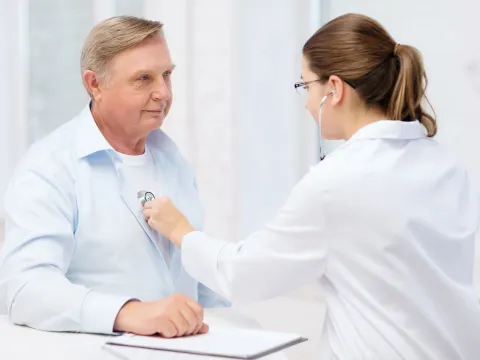- AdventHealth

Like other viral illnesses, coronavirus (COVID-19) can cause mild to severe respiratory symptoms, and even damage the lungs. If you have lung disease or asthma, you might be worried about how coronavirus could affect you.
Ongoing research has found that people with health conditions like lung disease seem to be at higher risk for more serious coronavirus infections. They may also have a worse outcome if they contract COVID-19, says the Centers for Disease Control and Prevention (CDC).
Despite these findings, you can do a lot to care for yourself. Always follow your physician’s advice in addition to these 3 precautions:
- Closely monitor your symptoms
- Keep up routine care
- Stay home
Tell Your Doctor About Worsening Respiratory Symptoms
Many people with a lung disease such as chronic obstructive pulmonary disease (COPD) may already have respiratory symptoms like a cough or shortness of breath. If that’s the case for you, it’s important to closely monitor your symptoms and note any changes, according to the National Heart, Lung, and Blood Institute. Also, keep watch for the most common symptoms of coronavirus — fever, dry cough and shortness of breath.
If you notice your condition’s symptoms are getting worse or if you think you may have coronavirus, contact your physician right away for advice on what to do. Even if you do not have a primary care physician, you can reach a doctor in the comfort of home through the convenient AdventHealth app.
To help prevent the spread of COVID-19, you should avoid the emergency department at your local hospital except in the event of an emergency. According to the CDC, emergency symptoms include:
- Bluish lips or face
- Confusion or inability to stay awake
- Ongoing chest pain or pressure
- Trouble breathing
Convenient Virtual Care Through Video Visits
Along with closely watching your symptoms, make sure you follow your disease management plan. Keeping your condition under control can help you lower your risk of a serious illness.
Continue to take your medicines as prescribed. This includes any inhaled or oral steroids. They can help you manage your symptoms.
Limit your contact with lung irritants. Certain contaminants, like air pollution and chemical fumes, can worsen your symptoms.
Stay in touch with your physician for ongoing care. Our telehealth service is available through the AdventHealth app. You can have a video visit with your provider for any regularly scheduled appointments. You can also reach out to your doctor to discuss:
- Nutritional counseling
- Oxygen therapy, if you need it
- Prescription refills
- Pulmonary rehabilitation
- Steps to manage other diseases you may have
- Ways to reduce stress
Stay Home to Stay Safe
People with lung disease are more prone to infections and complications from illnesses like the common cold and seasonal flu. The same seems to be true with coronavirus. So staying home as much as possible is one of the best things you can do to keep yourself safe and healthy.
To further reduce your risk for serious illness, follow these additional steps from the CDC:
- Clean and disinfect high-touch surfaces daily
- Don’t touch your mouth, nose or eyes
- Frequently wash your hands
- Have adequate supplies on hand
- Make a plan for if you do get sick
- Skip plane or cruise ship travel
- Steer clear of people who are sick
While staying home, it’s important to make sure you have the essentials on hand, like prescription and over-the-counter medication, as well as oxygen. Plan to have enough supplies to last a few weeks, in case you become sick. Talk with your doctor about getting extra medicine if needed.
Also, stock up on groceries and other household items. To help you stay home and avoid other people, consider having these goods delivered. Or talk with family members, friends and neighbors about how they can help you get the items you need.
Whole-Person Care for Coronavirus and Beyond
Though it may seem overwhelming at times, you’re not alone during this pandemic. We are here for whole-health physical, emotional and spiritual support. Visit our Coronavirus Resource Hub for more resources on protecting yourself from the virus and managing a chronic condition.


